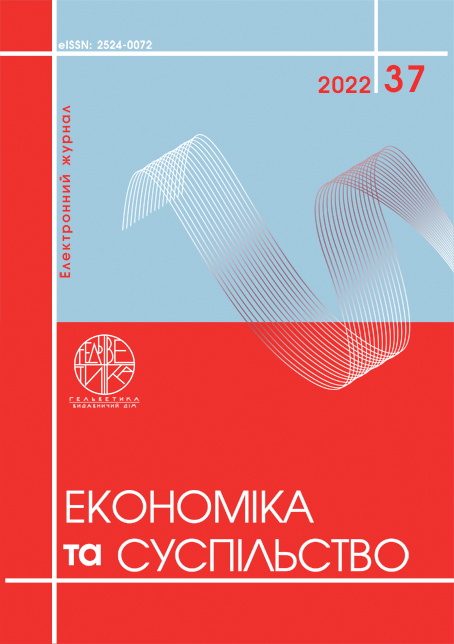ORGANIZATION OF LEISURE IN THE SPHERE OF TOURISM AND HOTEL INDUSTRY
Abstract
The method of planning event projects as a modern form of leisure organization by tourism and hotel enterprises is determined. The algorithm of actions for the implementation of the event project is established: 1) receiving a brief from the customer of the event. Which includes the following components: purpose and format of the event, target audience (primary, secondary), date and venue, number of guests, preliminary budget; 2) preparation of a creative proposal to be revealed through the atmosphere of the event. Creating an atmosphere – that is, an image, a general impression that will be noted and remembered by the participants, which is realized through the rule of the five senses – vision (light intensity; visual support, shows; signs; color design of halls; logo; etc.); hearing (sound and acoustics; musical accompaniment; background; signals; etc.); touch (texture; image matching; etc.); sense of smell (associations) and taste (menus, catering, snacks and food in general, served at the event, to meet the invited audience, harmoniously combined with the impressions received from other senses); 3) concluding an agreement that provides certain guarantees for the participants of the event. For the organizers - in case of refusal of the customer from the event on their own initiative: guarantees of the event and payment for their work, for the customer – guarantees in receiving the service of proper quality; 4) selection of personnel for the implementation of the event (main, additional); 5) development of project documentation at each stage of event planning. The list of documents that allow to hold an event effectively is considered: the concept of the event; final budget; project checklist (a document stating the time frame in which the organizer is obliged to perform certain tasks, and the customer to approve them or make certain adjustments); contact report (report on the work performed agreed by the organizer and the customer); scenario plan of the event; mounting sheet in the form of a network plan or strip plan. In the practice of leisure, it is recommended to write a cover letter every minute; press release, special newsletter with important, relevant information about the approach or holding of the event. The leisure industry for tourism and hospitality companies is a field of activity that, with small capital investments, can provide a significant increase in profits.
References
Oliver A.L., Montgomery K. Using field-configuring events for sense-making: A cognitive network approach. Journal of Management Studies. 2008. № 45. P. 1147–1167.
Hardy C., Maguire S. Discourse, field-configuring events, and change in organizations and institutional fields: narratives of DDT and the Stockholm convention. Academy of Management Journal. 2010.№ 53. P. 1365–1392.
Getz D., Andersson T. Editorial to the special issue on festival management. Scandinavian Journal of Hospitality and Tourism. 2009. № 9. P. 109–111.
Beech J., Kaiser S., Kaspar R. The Business of Events Management. UK : Pearson Education Limited, 2014. 393 p.
Shone A., Parry B. Successful event management: a practical handbook. Cengage Learning: EMEA, 2004. P. 13.
Tum J. Management of Event Operations / J. Tum, P. Norton, J. Nevan Wright. Oxford: lsevier/Butterworth Heinemann, 2006. 280 p.
Ніколюк О.В., Дьяченко Ю.В., Савченко Т.В. Особливості розвитку івент-менеджменту в Україні. Інвестиції: практика та досвід. 2021. № 6. С. 98–103.
Дьяченко Ю.В., Седікова І.А., Бондар В.А. Event -менеджмент як складник інформаційно-комунікаційних технологій у публічному управлінні. Вчені записки Таврійського національного університету імені В.І. Вернадського. 2020. № 6. С. 39–44.
Пашкевич М.Ю. Івент-технології у сфері дозвілля. Культурно-дозвіллєва діяльність у сучасному світі : кол. монографія. Київ : Вид-во: Ліра К, 2017. 328 с.
Oliver A.L., Montgomery K. (2008) Using field-configuring events for sense-making: A cognitive network approach. Journal of Management Studies, vol. 45, pp. 1147–1167.
Hardy C., Maguire S. (2010) Discourse, field-configuring events, and change in organizations and institutional fields: narratives of DDT and the Stockholm convention. Academy of Management Journal, vol. 53, pp. 1365–1392.
Getz D., Andersson T. (2009) Editorial to the special issue on festival management. Scandinavian Journal of Hospitality and Tourism, vol. 9, pp. 109–111.
Beech J., Kaiser S., Kaspar R. (2014) The Business of Events Management. UK : Pearson Education Limited, 393 p.
Shone A., Parry B. (2004) Successful event management: a practical handbook. Cengage Learning: EMEA, p. 13.
Tum J., Norton P. (2006) Management of Event Operations. Wright. Oxford: lsevier/Butterworth Heinemann, 280 p.
Nikolyuk O.V., Dyachenko Yu.V., Savchenko T.V. (2021) Osoblivosti rozvitku ivent-menedzhmentu v Ukrayini [Features of event management development in Ukraine]. Investiciyi: praktika ta dosvid, vol. 6, pp. 98–103.
Dyachenko Yu.V., Sedikova I.A., Bondar V.A. (2020) Event-menedzhment yak skladnik informacijno-komunikacijnih tehnologij u publichnomu upravlinni [Event management as a component of information and communication technologies in public administration]. Vcheni zapiski Tavrijskogo nacionalnogo universitetu imeni V.I. Vernadskogo, vol. 6, pp. 39–44.
Pashkevich M.Yu. (2017) Ivent-tehnologiyi u sferi dozvillya. Kulturno-dozvillyeva diyalnist u suchasnomu sviti [Event technologies in the field of leisure. Cultural and leisure activities in the modern world]. kol. monografiya [a monograph]. Kyiv: Vid-vo: Lira K, 328 p. (in Ukrainian)


